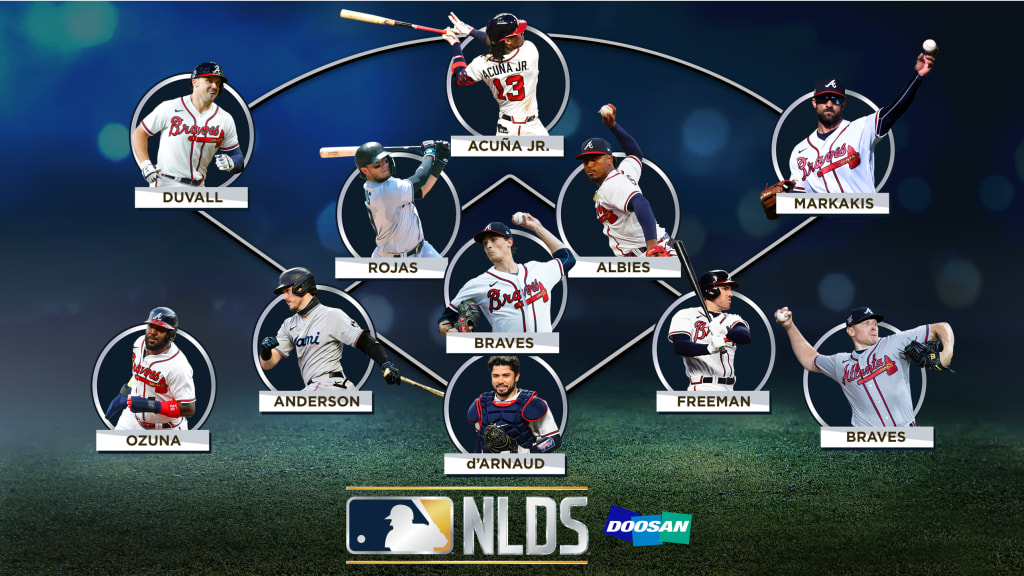
The Braves have dominated the Marlins in recent years, winning the head-to-head series in each of the last six seasons.
Atlanta is 67-37 against Miami during that stretch, including 35-13 over the last three years. Though it was closer this season -- the Braves won, 6-4 -- the series still featured some one-sided matchups, including Atlanta's record-setting 29-9 victory over Miami on Sept. 9.
That said, it's the Marlins who emerged victorious in the lone postseason meeting between the division rivals. The then-Florida Marlins defeated the Braves in six games in the 1997 National League Championship Series en route to winning the franchise's first World Series title.
With a second postseason meeting on tap in the 2020 NL Division Series, here's a position-by-position breakdown of their matchup.
Catcher
Travis d'Arnaud became a key cog in the Braves' offense this season, posting a career-best .919 OPS while hitting behind Freddie Freeman and Marcell Ozuna. He also hit nine homers in 44 games after clubbing 16 in just 92 games after joining the Rays during the 2019 season. His 25 homers since the start of June 2019 are the third most among catchers, trailing only J.T. Realmuto (28) and Gary Sánchez (27).
The Marlins have been starting Chad Wallach over Jorge Alfaro, as Wallach has impressed with the way he's handled Miami's young pitching staff.
Advantage: Braves
First base
The Marlins' Garrett Cooper got the nod at first base in the NL Wild Card Series, with Jesús Aguilar shifting to designated hitter, and hit the game-winning homer to clinch Miami's spot in the NLDS. Cooper provides a bit more range at first base and was solid offensively this season, with an .853 OPS and six homers in 34 games.
That said, the Braves' Freddie Freeman is an NL MVP Award candidate after putting up a remarkable .341/.462/.640 slash line -- all career highs -- while playing all 60 games. His 1.102 OPS was second in the Majors to Juan Soto (1.185), who played just 47 games for the Nationals, and only one player has racked up more RBIs than Freeman's 174 since the start of last season (José Abreu, 183). Freeman came up clutch in Game 1 of the NL Wild Card Series, ending a 13-inning game with a walk-off single.
Advantage: Braves
Second base
The Marlins' Jon Berti emerged as an offensive weapon down the stretch for Miami, recording a .464 on-base percentage in September. That continued in the NL Wild Card Series, in which he reached base in four of his eight plate appearances (one hit, two walks and a hit by pitch) while also stealing two bases in Game 1 after swiping nine in 39 regular-season games.
Atlanta's Ozzie Albies' return, however, takes the Braves' firepower to another level. Albies, who spent more than a month on the injured list with a bruised wrist, returned in September and hit .338 over the team's final 18 games with five home runs and a .953 OPS. That stretch included five games against the Marlins, during which Albies hit .476 (10-for-21) with two homers, six RBIs and a 1.262 OPS.
Advantage: Braves
Shortstop
This was a tight battle, with both Atlanta's Dansby Swanson and Miami's Miguel Rojas having career years of sorts in the shortened 60-game season. Swanson posted a career-best .809 OPS and led all shortstops with 10 defensive runs saved, while his 2.6 bWAR was fourth highest among all NL position players, trailing only Mookie Betts, Freeman and Manny Machado.
The Marlins' Rojas, meanwhile, put up career highs across the board with a .304/.392/.496 line. He got off to a blistering start, going 7-for-10 with three extra-base hits and five RBIs in the first three games before missing nearly a month due to COVID-19, but he's continued to rake since his return. The highlight of his season came against the Braves on Sept. 7, when he capped a four-hit game with what proved to be the game-winning double in the 10th.
Slight advantage: Marlins
Third base
The Braves' Austin Riley saw his late-season struggles (.239 BA, .669 OPS in September) continue in the NL Wild Card Series, when he went 1-for-8 with five strikeouts against the Reds.
Miami's Brian Anderson, meanwhile, led the Marlins in both home runs (11) and RBIs (38) while settling in at the hot corner after splitting his time between third base and right field over the last two seasons. He'll also try to rebound from a tough NL Wild Card Series in which he went 0-for-9 with four strikeouts against the Cubs.
Advantage: Marlins
Left field
Atlanta's Adam Duvall and Miami's Corey Dickerson both proved in the Wild Card Series that they have enough pop to make a series-changing impact, but Duvall has been more consistent in 2020. The Braves outfielder hit 16 home runs during the regular season -- tied for third-most in the NL -- before adding a key two-run shot in Atlanta's series-clinching win over the Reds. His .833 OPS was the second highest in his career, trailing only last year's mark of .882.
As for Dickerson, his go-ahead three-run blast in the seventh inning of Game 1 knocked out Cubs starter Kyle Hendricks and set the tone for Miami's sweep. That came after Dickerson recorded a career-low .713 OPS during the regular season.
Slight advantage: Braves
Center field
Starling Marte's status is up in the air for Miami after he sustained a fractured left pinkie finger in Game 1 of the NL Wild Card Series, which forced him to miss Game 2. It's unclear whether Marte will be healthy enough to swing a bat, which could leave Monte Harrison to start in center field.
Either way, it's tough to match the production of Atlanta's Ronald Acuña Jr. The 22-year-old superstar posted a .987 OPS -- his highest in three big league seasons -- thanks to a much-improved walk rate (18.8 percent in 2020 compared to 10.1 percent in 2018-19) that helped him record a .406 on-base percentage. Acuña is the ultimate dual-threat, racking up 55 homers and 45 stolen bases since the start of last season; he's the only player in the Majors with 40 homers and 40 steals during that span.
Advantage: Braves
Right field
The Braves know firsthand just how productive Marlins outfielder Matt Joyce can be. When Nick Markakis sustained a fracured left wrist on July 26 last season, it was Joyce who eventually stepped up to help Atlanta offset Markakis' absence. Joyce played well enough to secure a starting spot even upon Markakis' return, with Markakis shifting to left field and Joyce staying in right. Despite a decent arm, Joyce managed just a .682 OPS in 2020 (down from .858 in '19) after signing a one-year deal with the Marlins during the offseason.
Markakis' numbers also dipped for this season for the Braves, dropping to .704 in 37 games -- down from .776 last year. The difference here is that Joyce has been deferring to Lewis Brinson against left-handed starters, and Atlanta is likely to roll out southpaw Max Fried in Game 1 (and potentially on short rest for Game 5, if necessary).
Slight advantage: Braves
Designated hitter
Former Marlins outfielder Marcell Ozuna has proved to be one of the best free-agent signings of the offseason after inking with the Braves. In the regular season, he led the NL with 18 home runs and 56 RBIs and was third in the Majors with a 1.067 OPS before launching a selfie-worthy blast in the NL Wild Card Series. The addition of the designated hitter in the NL was also a significant boost for Ozuna, who struggled defensively in the outfield with the Cardinals over the last two seasons.
While Miami's Jesús Aguilar hasn't quite reproduced his All-Star numbers from 2018, he has been a huge addition for the Marlins. He posted a .277/.352/.457 slash line with 34 RBIs during the regular season, then came through with a late two-run homer in Game 1 of Miami's NL Wild Card Series sweep of the Cubs.
Advantage: Braves
Starting rotation
It's hard to pick against a Marlins rotation that allowed just one run over 11 2/3 innings in the club's two-game sweep of the Cubs. Of course, Atlanta's starters (and bullpen, for that matter) didn't allow a run over 22 innings in the team's sweep of the Reds. The Braves have played most of the season without staff ace Mike Soroka (torn right Achilles tendon), so the emergence of 22-year-old Ian Anderson has given the Braves a solid option behind Game 1 starter Max Fried, who is a perfect 7-0 with a 2.00 ERA in 12 starts this season (including playoffs). Anderson posted a 1.95 ERA in six starts down the stretch before striking out nine and allowing just two hits over six scoreless innings in Atlanta's Wild Card Series-clinching win.
Fellow 22-year-old Sixto Sánchez has also shown flashes of dominance for the Marlins, though he stumbled in his last two regular-season starts (including allowing four runs in three innings against the Braves in a Sept. 23 loss) before bouncing back in Game 2 against the Cubs. Sánchez combines with ace Sandy Alcantara and Pablo López to give the Marlins a formidable trio for the first three games.
Slight advantage: Braves
Bullpen
The Braves' bullpen was one of the best -- and most used -- in the Majors this season. Atlanta's relievers combined for a 3.40 ERA (second-best in the NL, behind the Dodgers' 2.74) while handling 272 2/3 innings. Only the Red Sox (278 innings) asked for more innings from their relief corps. That success continued into the Wild Card Series, with the Braves' bullpen racking up 14 strikeouts over nine scoreless innings against the Reds.
The Marlins, meanwhile, finished the regular season with a 5.50 bullpen ERA, highest among any of the 16 postseason teams and fifth highest overall.
Advantage: Braves
Prediction: Braves in 5



